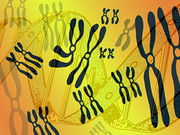Two studies show variant carriers have better lipid levels, lower likelihood of coronary artery disease
THURSDAY, March 3, 2016 (HealthDay News) — Mutations in the angiopoietin-like 4 (ANGPTL4) gene are associated with coronary artery disease, according to two studies published online March 2 in the New England Journal of Medicine.
Frederick E. Dewey, M.D., from the Regeneron Genetics Center in Tarrytown, N.Y., and colleagues sequenced the exons of ANGPTL4 in samples from 42,930 participants in the DiscovEHR human genetics study. The researchers identified 1,661 heterozygotes and 17 homozygotes for the E40K variant and 75 other participants with monoallelic inactivating mutations in ANGPTL4. Carriers of the E40K variant had levels of triglycerides that were 13 percent lower and levels of high-density lipoprotein cholesterol that were 7 percent higher than noncarriers. Compared with noncarriers, E40K variant carriers were less likely to have coronary artery disease (odds ratio, 0.81).
Nathan O. Stitziel, M.D., Ph.D., from the Washington University School of Medicine in St. Louis, and colleagues tested 54,003 coding-sequence variants covering 13,715 human genes in up to 72,868 patients with coronary artery disease and 120,770 controls. The researchers identified significant associations for coronary artery disease and low-frequency missense mutations in SVEP1 (odds ratio, 1.14) and ANGPTL4 (odds ratio, 0.86). Nine carriers of loss-of-function mutations in ANGPTL4 were identified in 6,924 patients with myocardial infarction, compared with 19 carriers among 6,834 controls (odds ratio, 0.47). Carriers of loss-of-function alleles in ANGPTL4 had 35 percent lower triglyceride levels.
“We found that carriers of loss-of-function mutations in ANGPTL4 had triglyceride levels that were lower than those among noncarriers; these mutations were also associated with protection from coronary artery disease,” Stitziel and colleagues write.
The Dewey study was funded by Regeneron Pharmaceuticals.
Abstract – Dewey
Full Text
Abstract – Stitziel
Full Text
Editorial
Copyright © 2016 HealthDay. All rights reserved.








